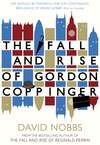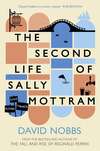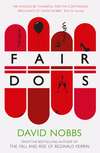Buch lesen: «Obstacles to Young Love»
Obstacles to Young Love
David Nobbs

In memory of Father John Medcalf
Table of Contents
Cover Page
Title Page
PART ONE Obstacles to Young Love 1978
PART TWO The Other Side of the World 1982
PART THREE The Rocky Road to Seville 1991–1993
PART FOUR Get Stuffed 1995
PART FIVE Second Time Around 1995–1999
PART SIX A Glorious Summer’s Day 1999
PART SEVEN Farewells 1999–2002
PART EIGHT They Say You Should Never Go Back 2003–2004
PART NINE Wide Skies 2008
Author’s Note
Acknowledgements
About the Author
Copyright
About the Publisher
PART ONE Obstacles to Young Love 1978
Three mighty obstacles threaten the burgeoning love of childhood sweethearts Timothy Pickering and Naomi Walls. They are Steven Venables, a dead curlew, and God.
God it is who comes between them in Earls Court.
‘I don’t feel like it tonight, Naomi.’
She has turned towards him, sweet in her slenderness in the sagging bed beneath the print of old Whitstable. She has run her hand down his cheek and over his chin. Their roughness has pleased her. ‘You’ll need to shave again tomorrow,’ she has said. And he has stiffened, not in the manner of the night before but in a shrinking way that has shocked her to her core, and she in the eighteenth year of her life has for the first time been forced to ask the question that has been asked a billion times before by women of their men, ‘What’s wrong?’ And it is this that has drawn from him, like a wasp sting from a plump arm, the grudging admission, ‘I don’t feel like it tonight, Naomi.’
‘You felt like it last night.’ Naomi knows that her riposte is not worthy of her.
‘Last night was last night.’ Timothy is aware that his riposte is abysmal. He has spoken it sullenly, and his awareness of its inadequacy makes him feel more sullen still. He is also seventeen years old, and unaware of so much, including his own good looks. When he wakes in the mornings he feels awkward, clumsy, raw, shy, ignorant. He does not feel handsome.
They are now miles apart, their naked bodies only touching because the exhausted, abused bed sags so much that it’s impossible not to roll towards the middle.
‘We shouldn’t have done any of it,’ he says. They are speaking in little more than whispers. It’s a cheap hotel, and the soundproofing is almost non-existent. ‘We shouldn’t have come.’
‘No use regretting it now. We did come.’
She is aware of the double entendre. He isn’t. His thoughts are a million miles from sex.
‘We’ve had a great time,’ she says. ‘Whether we should have done it or not, why spoil it now? Why go home with our tails between our legs?’
She touches his tail between his legs. It’s as soft as an underdone egg.
‘Please don’t.’
‘Timothy!’ It’s both a rebuke and a wail of anguish. ‘If you’re tired, that’s all right. It’s been a long day and you must have…’ She wants to say ‘really knackered yourself last night’ but there are some words that you can’t easily say to Timothy and she comes out with the much less felicitous, ridiculously formal, ‘…taken a lot out of yourself last night.’ And put some of it into me, she thinks, shocking herself and realising for the first time that there might be quite a gulf between them.
‘It’s not that,’ he exclaims, his manhood threatened. ‘It’s just…it’s wrong.’
‘It wasn’t wrong yesterday.’
‘It was. We just forgot it was.’
‘I actually thought it was fantastic. I thought it was as good as being Juliet in front of four hundred kids.’
‘Well, it was better than being Romeo. I hated every ruddy minute of that.’
‘I know you did.’
Everyone at Coningsfield Grammar had expected that Naomi would be Juliet in the school play, but Mr Prentice chose Timothy as Romeo on a whim. Most people, and especially Mark Cosgrove and his mother, had assumed Mark Cosgrove would be Romeo. His mother has not forgiven Mr Prentice. Indeed, she has left her husband for him, run away with him, and embarked on the task of making the rest of his life miserable.
Mr Prentice’s whim wasn’t exactly a success, but it wasn’t a catastrophe either. Timothy hadn’t possessed the skills to play Romeo well, but the combination of his gawkiness, his intensity and those dark good looks of which he was so unaware moved the audience quite remarkably. The school hall became Verona.
Mr Prentice had cast them both in small parts in the previous year’s play, Peter Shaffer’s The Royal Hunt of the Sun, but they hadn’t taken much notice of each other. Now, though, he told them, ‘Feel. Feel. Feel. Feel the excitement of young love in the face of the world’s hostility. Feel the emotion. Feel the sexuality.’ They felt it. Mr Prentice, yes and Shakespeare too, must share some of the blame for what happened, for their falling in love, pretending to their parents that they were going on a school trip to Paris, and ending up in a sagging bed with thin, exhausted pillows in Earls Court.
‘Don’t you fancy me any more?’
‘Oh, Naomi!’
She is almost as disgusted by her question as he is. He doesn’t say, ‘Of course I do,’ and she doesn’t blame him.
There’s a silence, quite a long silence, but she knows that he is going to speak and that he is only silent because he’s wondering how to begin, so she doesn’t break it. A motorbike roars boastfully past. Naomi thinks of all the grown-up things that they have done in London. They’ve been to see foreign films, films with subtitles, films that don’t ever reach Coningsfield. They’ve eaten in restaurants. Well, no, only in one restaurant actually. The Pasticceria Amalfi, a cheery Italian place in Old Compton Street. It had all the easy surface friendliness of Italy. They have been frightened by London, aware of their vast ignorance of the world. They have been frightened by Soho, which they have imagined to be humming with wickedness behind the grime. They have felt very vulnerable, cowed by the vastness of London, and, despite that vastness, they have felt disturbingly visible, expecting at any moment to be spotted by someone who knows their parents. On the first day of their visit they saw some cheery young people entering the Amalfi, and were emboldened to follow in their slipstream. It turned out to be safe and warm. They have eaten there on all three days of that long, lovely, disturbing weekend.
At last Timothy speaks.
‘It was when that funny old woman came up to us at breakfast. I thought she was going to accuse us.’
‘Well, so did I.’
‘I just felt so guilty. Didn’t you?’
‘No. I felt a bit afraid that I was going to be shouted at, that’s all. Well, yes, I have been feeling guilty about lying to Mum and Dad and taking their money. But not about the sex. We’re not in the Middle Ages.’
Timothy hasn’t the words to explain how he feels. No, it isn’t just about the sex – and even he knows that to say that the sex was wrong sounds horribly prim and proper and old-fashioned even for a Coningsfield boy – but the sex is the cause of the deception, and the deception makes him feel awful in the pit of his stomach. It’s taking away all the memory of the joy, and after all they are in the middle of confirmation classes and what’s the point of all that if they don’t take it seriously?
But all he can find in himself to say is, ‘What would the Reverend Bideford say if he knew? What would Mr Cattermole say?’
‘I don’t care what they say. It’s what we say that matters. Mr Cattermole’s a lech, anyway.’
‘It’s what our parents would say.’
He has touched a nerve. Naomi’s father is an elder in the church. Her mother teaches at Sunday School. They are quietly, unshowily devout. Naomi is going to confirmation classes because it pleases them, and she likes to please them, and because Timothy is going. Timothy’s reasons are much more complex, and much less understood. His relationship with God makes him feel that he has a place in the scheme of things, that he is important, that there is a point to being alive in a house full of death. Obeying a moral code gives him a reason to avoid what frightens him. His religion tells him what is good for him. It’s the nearest he’s ever come to a mother. And now, because of Romeo and Juliet, because of Shakespeare, because of Mr Prentice, he’s in love, he’s told terrible lies, he’s received money under false pretences, there are more lies still to be told, he’s truly wretched.
If only they could talk. In the distance some drunks are trying to sing. In room eight the silence is deep.
He reaches out with a shy hand, traces the inside of her right thigh with one finger, feels the stubborn softness of his prick, and turns away slightly lest she feel it too.
‘Maybe we should get married,’ he says at last.
‘We can’t. We’re still at school.’
‘Well…engaged, then.’
She’s quite excited, but she isn’t going to show it. Besides, it’s absurd.
‘Don’t you want to get engaged?’ he persists.
‘I don’t know.’ It sounds feeble, but it’s the truth. There’s nothing else she could possibly say.
‘I thought you loved me.’
‘I do, but we’re still at school.’
‘I don’t see what that’s got to do with it.’
Nor does she, but she isn’t going to agree. It becomes a long silence, too long, and the longer a silence lasts, the harder it is to break it. She thinks about what he did to her and what he let her do to him barely seventeen hours ago. How could he take this attitude so soon after that? She wants to talk about it, reflect on it, remember it together, as would seem natural. But it doesn’t seem natural. It was so much easier to do than to talk about. She finds that she can’t actually use the words that would describe the actions. Words could make what was beautiful sound dirty. She takes refuge in formality.
‘Don’t tell me you didn’t enjoy the fellatio,’ she says.
‘Which film was that?’
‘Oh, Timothy! Fellatio’s…what I did to you this morning.’
‘Sorry. I thought he was an Italian film director. You’re always going on about films and film people that I’ve never heard of, showing me up.’
‘I don’t do it to show you up. I have to be interested in films. I’ve decided that I’m going to be an actress.’
Of all the times to drop this bombshell. Of all the times.
The train journey home is not a happy one. Timothy stares resolutely out of the window, as if the answer to their problems is going to be found out there.
‘You won’t find the answer in some passing farmyard.’
‘Farmyards don’t pass. We pass them.’
‘I know that, you cretin.’
‘You won’t get far as an actress if you use the language so sloppily.’
‘Don’t be stupid. We don’t make it up. It gets written. By writers.’
‘I know that. I was Romeo, after all.’
He continues to pretend to be very interested in the singularly dreary countryside through which they are rattling.
‘Nobody could be that interested in pylons.’
‘What?’
‘You’re pretending you’re looking at things. You’re not. You’re just eaten up by jealousy.’
They aren’t speaking too loudly. There’s a nun in a seat across the corridor.
‘I’m not jealous.’ Now it begins to pour out of him. ‘I’m not jealous. I’m just astounded. You’re religious.’
‘What’s that got to do with it?’
‘Actors are all immoral. The men are all as bent as West End Lane.’
‘What’s West End Lane?’
‘I don’t know. It’s a road somewhere, I suppose, and I suppose it must be as bent as actors. It’s what my dad always says, anyway. And I expect the girls are all thespians.’
‘Thespians means actors.’ She can’t keep a sliver of scorn out of her voice. ‘You mean lesbians.’
‘You see.’
‘What?’
‘I don’t know anything about it. You do. We’ll drift apart.’
‘We won’t drift apart. We don’t need to drift apart. I love you, Timothy.’
‘Good on you, lass,’ says the ticket collector, arriving at Naomi’s shoulder like a steamer appearing out of the fog. ‘That’s what I like to hear. Tickets, please.’
They show him their tickets.
‘I’m frightened,’ says Timothy softly.
Naomi recognises the truth of this and touches him on the arm. The ticket inspector sees the gesture and smiles. The nun can’t find her ticket and blushes.
‘You’ll be a huge success. You’ll go and live in London.’
‘I needn’t. I can come home between jobs.’
There’s a problem with the nun’s ticket. The nun blushes again. Her face is smooth, serene, almost aggressively serene. Yet how she blushes.
‘Besides, you could come to London. You can stuff animals in London, can’t you?’
‘I’ll be working for my dad. He hates London. He has a name for it. “The smoke”.’
Naomi wants to tell him that everyone calls it ‘The Smoke’, but she judges it to be unwise.
‘Anyway, we don’t stuff animals. That shows that you’re ignorant too. We’re just ignorant about different things.’
The business with the nun is sorted, but the ticket inspector turns to have a word with them. They both know that he does this because he fancies Naomi.
‘Ticket for the wrong train. Had to let her off,’ he says in a conspiratorial whisper. ‘Drive me up the wall they do. Always say they’re so unworldly that they don’t understand the ticketing restrictions. Same thing last week with a monk. Let him off too. Must be becoming a habit.’
Naomi recognises that this is a joke and laughs politely. Timothy doesn’t.
‘It was a joke, lad. Monk, habit. A joke,’ says the ticket inspector.
It is now Timothy’s turn to blush.
‘He’s not good enough for you,’ says the ticket inspector with a jovial, hateful wink.
What a journey this is for blushing. Now it’s Naomi’s turn. She blazes with embarrassment and anger. The ticket inspector looks from one to the other, realises he’s put his foot in it, and digs the hole that he has made.
‘I think I’ve put my foot in it,’ he says, as he departs.
‘You see,’ says Timothy miserably. ‘That’s what everyone’ll say.’
‘Bollocks,’ says Naomi more loudly than she intended.
Timothy looks shocked. The nun buries herself in her book.
‘Quiet. She’ll hear,’ says Timothy.
‘You’re always so worried what people will think. She isn’t listening. She isn’t interested in us. She’s reading her devotions or whatever it is they have to read.’
‘You’ll spend five months filming in Caracas.’
‘If I do, I’ll dream of you.’
‘You won’t. You’ll fall for Nigel Havers.’
‘I won’t fall for Nigel Havers. God, how many pylons are there in Britain?’
‘You shouldn’t use God’s name in vain.’
‘That wasn’t God’s name. It was just an expression. I love you. I really do.’
‘You do now, but when you’re famous…’
‘I won’t be famous and if I am it won’t change me. “She comes in the shop and she’s just like one of us,” says attractive olive-skinned assistant Val Pogson.’
‘What?’
‘It’s what they say about nice actresses who haven’t let their fame go to their heads. She enjoys the glamour of filming in exotic places, but she’s always thrilled to get back to her modest terrace home in Battersea and her taxidermist husband.’
‘You won’t want children.’
She is silent for just a moment.
‘I can’t say I’ve thought about it, but…I think I’d really love to have your child. Honestly, Timothy.’
He leans across and kisses her. His tongue explores her mouth. He didn’t mean to do this, but he can’t help it.
The nun develops a sudden interest in pylons.
Let them be happy in their kisses. They have no idea of the storm that is about to break over their heads.
Timothy’s steps never quicken as he approaches number ninety-six, but today they slow even more than usual. His father is not an unkindly man, he does his best, but it is not a happy house for Timothy. It’s a square, stone, Victorian house on the gentle hill that takes the dual carriageway out of town in what was once one of the better areas of Coningsfield, but it’s an area that’s blighted by traffic and is slowly going down. Number ninety-four is a B & B called Ascot House. Number ninety-eight is lived in by an old man, Mr Lewis, and his wife, Mrs Taylor. Well, this is how Mr Lewis introduces them to people, on the increasingly rare occasions when he needs to introduce them. Timothy laughs because as the years pass and their health declines, Mr Lewis walks further and further behind Mrs Taylor on trips to the shops that are becoming slower and more hazardous by the month. Timothy’s father, Roly, rebukes his only son for laughing at the elderly.
Timothy walks past the shaved lawn of Ascot House – ‘Quality outside is the harbinger of quality inside, in the world of the B & B,’ says the proprietress, Miss de Beauvoir, whose real name is Mrs Smith. In fact, she says this all too frequently. Her remark does not impress Timothy. He has been inside.
The lawn of number ninety-six is long and dotted with dandelions and docks. Last month, after a good rain, a post was hammered into the ground, and a board was hammered onto the post, bearing a message that alarmed Timothy. It says, ‘R. Pickering and Son – Taxidermists’. Timothy’s heart does not swell with pride as his legs lead him leadenly past it. He has been Romeo on stage and in life. Now he is again the only son of a taxidermist whose wife ran off with a plumber when Timothy was two and has never so much as sent him a birthday card since. ‘A plumber!’ his dad occasionally says, shaking his head in disbelief, as if the man’s occupation is a greater blow to his self-esteem than his wife’s abandonment of him.
As Timothy sees the board, he recalls that moment a month ago when he came home from school and first saw it. As he stared at it, the front door squeaked open – his dad wasn’t exactly generous with anything, and that included WD40 – and his dad stood there, smiling.
‘I’m taking you into the business, son of mine. You’re ready now.’
Timothy had found nothing to say.
‘Aren’t you going to thank me?’
‘Yes, Dad. Sorry, Dad. Thank you.’
‘You’re welcome.’
Timothy was too young to realise that by this his dad was trying as best he could to say, ‘I love you, son.’
They had gone inside and his father had made a pot of tea and produced a couple of scones – a rare treat, but treats came with strings at number ninety-six, and the string was that his future was going to be discussed, or rather announced, and fixed for eternity. Timothy liked Marmite on his scones: he had described the clash between sweet and sour as ‘orgasmic’ but that was before his weekend with Naomi. On this occasion he hadn’t dared get Marmite. His father disapproved. ‘Marmite on scones? What travesty is this?’
‘Well, lad, I saw you on stage and I’ll say this, you were good. Our Timothy, the product of my very own seed, playing Romeo, who’d have thought it?’ His father had his very own, idiosyncratic way of expressing himself. ‘As I say, you were good, but…but, Timothy, you weren’t that good. You are not an actor. The boards are not in your blood. The curtain has fallen on your brief career.’
‘No, Dad, I know, I agree, I don’t want to be an actor.’
‘Good. Good. That’s good. So what can you do? You’re not stupid, but…but, Timothy. We don’t want you ending up a plumber now, do we? Some say taxidermy is a dying art. Not so, my boy. Not so. More tea?’
‘Thanks.’
Timothy had never thought of not being a taxidermist, but only because it had never occurred to him that he was ever going to be one. His ambitions stretched only to avoiding certain careers. He didn’t want to be an actor, or a plumber, or a dentist, or a lavatory cleaner, or a teacher, or a racing driver. He expected that, being neither brilliant nor thick, he would go to one of the lesser universities, and if that didn’t work out there was always Coningsfield Polytechnic. In the course of his prolonged studies he might or might not discover his vocation, which might or might not be the Church. He’d had no idea that he would suddenly, even urgently, need to make a decision as to his future. He was therefore unprepared to make a decision. Therefore he made no decision. And so, on that dark afternoon in that dark house, he realised that he didn’t want to be a taxidermist five minutes after he had become one.
Later, when he looked back on that afternoon, he realised that there was no way he could have made a decision, because there was no way he could have told his lonely old father, with his failing eyesight and his sad, short marriage, that he was not going to join him and support him in his business.
‘I have a steady trade, good contacts with most zoos, sources of supply from some of the great shooting estates of Old England. I’ve done well.’
‘You certainly have, Dad.’
‘It’s not riches. Riches don’t last. The Good Lord knows that. But it’s steady. Very steady. The Pickerings are steady people, Timothy, and you, you too are, I think, steady.’
‘I hope so, Dad.’
‘Is plumbing steady? No, it isn’t. Three warm winters on the trot and they’re knackered. But the world will always need taxidermists. Youngsters aren’t going into it. Youngsters don’t see further than the ends of their noses. That Naomi! Juliet! You can bet your bottom drawer she’ll be wanting to be a film star, off to London before the frost gets into the parsnips. I’d take money on it if gambling wasn’t a sin. No, as a taxidermist, boy, you’ll be able to clean up very nicely.’
Timothy has not told his dad that he has walked out with Naomi. He has certainly not told him that he has been to London with her, fucked her, gone down on her, been sucked by her. In some ways Timothy and his father are alike, but with regard to Naomi there is a gulf between them that makes the Gulf of Mexico look like a village duck pond.
Timothy has time to recall this conversation in its entirety because he is walking up the garden path very slowly indeed. The house is dark. There is not a room in it, including the smallest room, that does not contain at least one dead animal or bird. In the smallest room it is, naturally, the smallest creature, a mouse that died of heart failure when startled by the Ascot House cat. There is stained glass round the front door, only slightly cracked. The floors are a monument to the past glories of linoleum. When he opens the front door Timothy feels that he is stepping back fifty years.
At last, though, he can delay the moment no longer. Earls Court, the Amalfi, the whole of London fades away. The door squeaks slowly open, he smells the slightly stale, utterly masculine linoleum and lavatory cleaner smell of his home and there, in the dim, narrow hall, at the bottom of the creaky stairs, stands his father, staring at him, glaring at him, pulling his braces forward and then letting them fall back onto his grimy ketchup-stained shirt with a savagery that sends a chill through Timothy’s whole body.
His father comes forward and punches him in the face. Timothy staggers back, crashes into the little table by the door, falls to the ground. The dead fox that was on the table, his father’s pride and joy, the one that the customers first see on arrival, falls onto Timothy’s face. He hates the feel of the dead fox. He screams, grabs it and flings it off him. He cowers, expecting to be hit again. Then he thinks of Naomi and how he would hate her to see him cowering, and he glares at his father and tries to stand, but it’s as though his legs are made of rubber, he falls again.
He looks up at his father who no longer seems angry.
‘Naomi’s mother met the French teacher in Stead and Simpson’s,’ says his father. ‘A most unfortunate encounter.’
In that moment Timothy realises how naive it was of them to have thought that they could get away with it, and with his recognition of his naivety and of Naomi’s naivety the whole long weekend seems to be stripped of all its joy and beauty and become a tawdry episode involving two very young schoolchildren who thought they were grown up. He hates this. He barely listens to his father. He can guess the details anyway. Naomi had told her parents the French teacher was taking a school trip to Paris. But the French teacher is not in Paris, she is in Stead and Simpson’s in Coningsfield. Naomi’s mother wonders where Naomi can be. The French teacher knows, from her friend Mr Prentice, that Naomi and Timothy are seeing each other. It might be a good idea to phone Mr Pickering. Mr Pickering tells her that his son has gone to France on a school trip.
Roly Pickering bends over, holds out his hand to his son, and pulls him gently to his feet. He kisses the top of his son’s head.
‘I’m sorry I hit you,’ he says. ‘You’re all I have.’
Naomi walks from the station to the bus station, where she catches the number twenty-eight Pouters End bus. She sits upstairs and gazes out over her home town, seeing it and not seeing it, loving it and despising it. So much has happened since she took this journey in the opposite direction just three days ago. At moments she feels too adult to be contained here, to go back to school and hockey and maths and confirmation classes, and then she feels a wave of regret for her disappearing childhood. So many wonderful things happened in London, yet in the end the joy went out of it like a pricked…she is going to think ‘balloon’, but she had been Juliet in Shakespeare and clichés just won’t do. Like a shocked prick. And she feels shocked to be thinking about pricks, and in particular Timothy’s prick, on the twenty-eight bus, in her home town. But the sex had been a revelation, and it was sex born of love, and she just can’t think of any of it as in any way smutty or dirty or degrading. She holds her legs tightly together, as if the beautiful memory of it might slide out from between them. And then an earthquake of loneliness cracks her body and she shudders with the fear of the days without Timothy beside her in bed. She thinks about his lovely sullen darkness, his rough stubble, his occasional devastating shy smile. She loves him. She thinks about praying to God to arrange for her to leave school and live with him and marry him. But God would be too busy and people just didn’t pray on the twenty-eight bus and in any case she isn’t certain…no, she isn’t yet ready to admit to herself that she has doubts about the existence of God. That’s too frightening. That would make home life too difficult.
She is thinking so many things that she almost forgets to get off the bus at Cragley Road. She rings the bell and lugs her case down the stairs in a rush, trips, almost falls, almost tumbles out of the bus into the cool of the autumn evening.
She gazes up the hill towards the big houses of the old textile magnates in Upper Cragley Road, but her path takes her down past the pleasant detached but less impressive houses of Lower Cragley Road. It’s still posh enough to have only names on the houses, though, the numbers being a secret known only to the beleaguered postmen.
L’Ancresse. A pleasant 1930s house with simple lines and a square bay window in the lounge. It had been Laburnum Villa but her parents had renamed it after their favourite bay in Guernsey, where they used to take their seaside holidays. Unlike Timothy, Naomi has always hurried happily to the warmth, safety and sheer good spirits of her family home, but today…today she cannot believe that it is sitting there so calm, so quiet, so sure of itself, as if nothing has changed in the three days since she was last there, and of course, inside the house, now that her elder brothers have fled the nest, nothing will have changed.
And she realises, with a flash of horror, that she has forgotten to make any preparations for the questions that she will be asked about Paris. And hers is a family that asks about everything, shares everything, demands that you share everything.
She stands stock still beside the old English rose bush which is still in glorious flower. Well, it’s too late now. She marches to the front door, gets her key from her handbag, and opens the door, which does not squeak. There is no shortage of everyday essentials in the Walls household, and that includes WD40.
The house is quiet, strangely quiet, but Naomi is too nervous to notice this. Besides, she is not actually always very sensitive to atmosphere. Her teachers at drama school will soon be working on this.
‘Hello!’ she calls out. ‘I’m back. Je suis retournée.’
Her mother and her father emerge slowly from the kitchen and the study respectively. Her mother is smiling. Naomi does not notice that the smile is strained. Her father is not smiling. There is nothing unusual about this. He is not a smiler.
Her mother kisses her, and says, ‘So. How was Paris? Come through and tell us.’
Her father does not kiss her. There is nothing unusual in this. He is not a kisser.
The evening sun is slanting across the kitchen, lighting up the oranges in the Japanese bowl. There’s a smell that Naomi recognises and loves, yet today, for the first time, it seems to smell of the past. It’s a shepherd’s pie, browning in the oven.
She doesn’t know where to begin.
‘It was lovely,’ she says.
‘What did you see?’ asks her father. Naomi is too terrified to notice that he is being a schoolmaster now, not a father.
‘Er…well, the Champs Élysées. Notre Dame.’ She thinks hard, desperately. ‘Les Halles.’
There is silence. She has run out of sights.
‘Not a lot, in three days.’
Her father’s voice is quietly, regretfully merciless. Her mother is moved to try to rescue her daughter, even though she knows that the rescue will itself make matters worse.


















